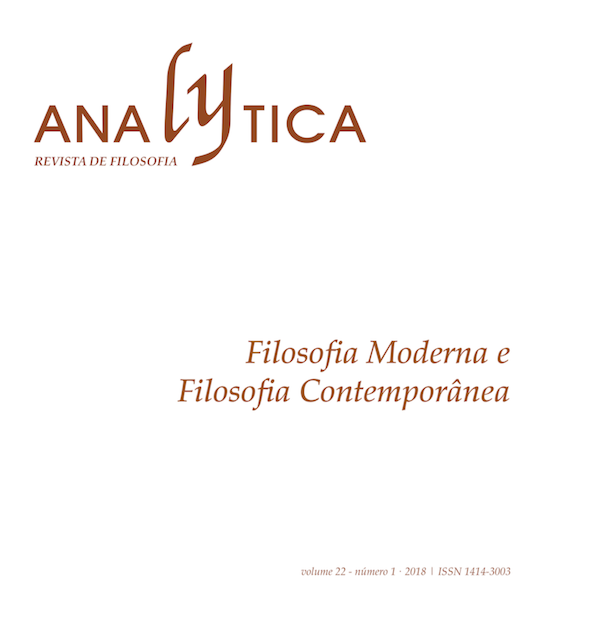A Ciência Política em Thomas Reid
DOI:
https://doi.org/10.35920/arf.v22i1.24728Palavras-chave:
senso comum, ciência, política, filosofia da natureza, experiência, Thomas Reid, common sense, science, politics, philosophy of nature, experienceResumo
O artigo compreende a discussão de três aspectos do pensamento político de Thomas Reid. Inicialmente, apresenta-se e discute-se a compreensão reidiana de ciência política. Na sequência, argumenta-se que, diferentemente dos princípios primeiros de outros campos do saber, como, por exemplo, a matemática, a filosofia da mente e a moral, os princípios primeiros da ciência política não são princípios primeiros do senso comum. A política é fundada sobre uma forma de conhecimento empírico que não pode ser identificada com o senso comum, com os julgamentos e crenças devidos à constituição original da mente que são compartilhadas pela maior parte dos seres humanos. Por fim, argumenta-se, a partir de um paralelo com a filosofia da natureza, que o senso comum possui apenas um papel metodológico no âmbito da ciência política.
Abstract
The paper covers the discussion of three aspects of Thomas Reid’s political thought. Initially, it presents and discusses Reid’s understanding of Politics. Secondly, it is argued that, unlike the first principles of other branches of knowledge, such as Mathematics, Philosophy of Mind and Morals, the first principles of Politics are not the first principles of common sense. Politics is founded on a form of empirical knowledge that cannot be identified with common sense, with the judgments and beliefs due to the original constitution of mind that are shared by most humans. Finally, it is argued, from a parallel with the philosophy of nature, that common sense has only a methodological role in Politics.
Downloads
Referências
DUCHEYNE, S. (2002) "Reid’s adaptation and radicalization of Newtons’s Natural Philosophy. History of European Ideas, vol. 32, número 2, pp. 173-189. https://doi.org/10.1016/j.histeuroideas.2006.02.001
LAUDAN, L. (1991) Science and hypothesis, historical essays on scientific methodology. Dordrecht: Reidel. https://doi.org/10.1007/978-94-015-7288-0
MARCIL-LACOSTE, L. (1982) Claude Buffier and Thomas Reid: Two Common-Sense Philosophers. Kingston and Montreal: McGill-Queen’s University Press.
PELSER, A. (2010) "Belief in Reid’s theory of perception. History of Philosophy Quarterly, vol. 27, número 4, pp. 359-378.
REDEKOP, B. (2001) "Thomas Reid and the problem of induction: from common experience to common sense. Studies in History and Philosophy of Science, vol. 33, pp. 35-57.
REID, T. (2010) Essays on the active powers of man. Edited by Knud Haakonssen and James A. Harris. Edinburgh: Edinburgh University Press. https://doi.org/10.1093/oseo/instance.00106526
REID, T. (2002) Essays on the intellectual powers of man. Edited by Derek Brookes. Edinburgh: Edinburgh
University Press. https://doi.org/10.1093/oseo/instance.00106533
REID, T. (1997) Inquiry into the human mind on the principles of common sense. Edited by Derek Brookes.
Edinburgh: Edinburgh University Press. https://doi.org/10.1093/oseo/instance.00106376
REID, T. (2015) Thomas Reid on politics and society. Edited by Knud Haakonssen and Paul Wood. Edinburgh: Edinburgh University Press. https://doi.org/10.1093/oseo/instance.00174897
Downloads
Publicado
Como Citar
Edição
Seção
Licença
Os autores que publicam nesta revista concordam com os seguintes termos:
- Os autores mantêm os direitos autorais e concedem à revista o direito de primeira publicação, com o trabalho simultaneamente licenciado sob a Licença Creative Commons Atribuição-SemDerivações 4.0 Internacional (CC BY-ND 4.0), que permite a redistribuição, comercial ou não comercial, desde que a obra original não seja modificada e que seja atribuído o crédito ao autor.
- Os autores têm autorização para assumir contratos adicionais separadamente para distribuição não-exclusiva da versão do trabalho publicada nesta revista (ex.: publicar em repositório institucional ou como capítulo de livro), com reconhecimento de autoria e publicação inicial nesta revista.
- Os autores têm permissão e são estimulados a publicar e distribuir seu trabalho online (ex.: em repositórios institucionais ou na sua página pessoal) a qualquer ponto antes ou durante o processo editorial, já que isso pode gerar alterações produtivas, bem como aumentar o impacto e a citação do trabalho publicado (Veja O Efeito do Acesso Livre).






